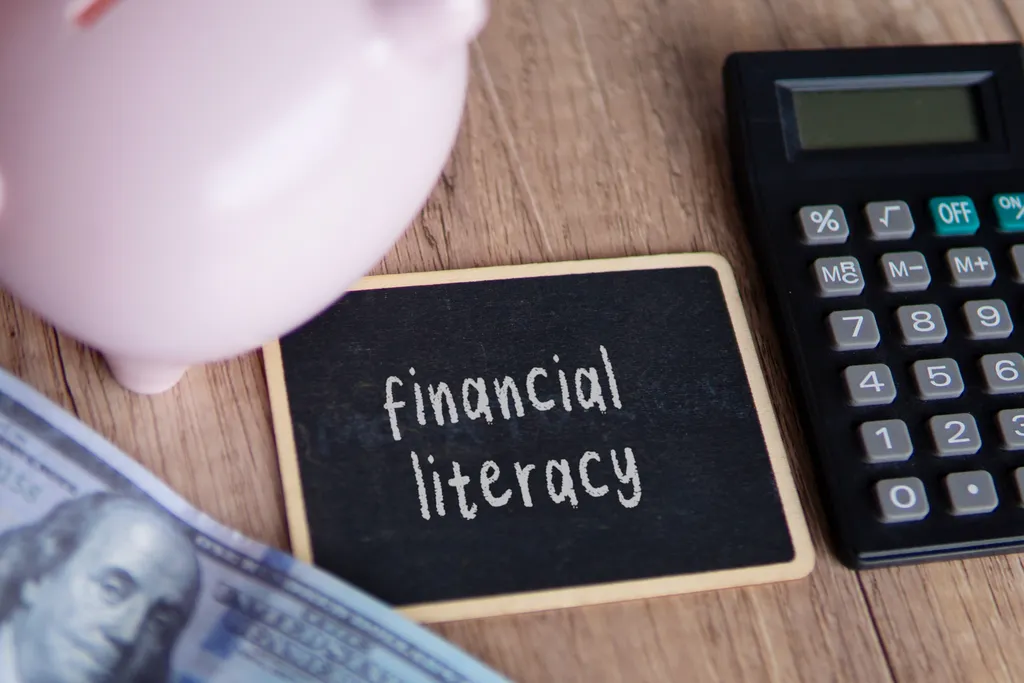Introduction
Financial literacy, frequently neglected in modern society, is crucial for individuals and communities. Financial knowledge and skills are essential in today’s economy. The importance of financial literacy is societal. It helps people make informed decisions, promotes sustainable financial behavior, and boosts economic progress. As this report explains, financial literacy significantly impacts individuals and society.
Understanding Financial Literacy
Financial knowledge means that a person knows how to handle money well. This includes several things:
Understanding and using financial concepts:
This includes simple ideas about money, like interest rates, inflation, and how much money is worth over time. People who are good at these things can make intelligent choices about savings, investments, and planning for retirement.
Financial Management:
It includes making a budget, paying taxes, handling debt, and other parts of financial planning. Good money management is essential for balancing your life and avoiding financial stress.
Investment Knowledge:
A big part of being financially literate is knowing about the different types of investments, the risks that come with them, and the possible rewards. It helps people make more money by spreading their assets and increasing their wealth.
Risk Management:
It means being able to understand and handle financial risks. Financially savvy people know they need insurance, emergency funds, and other ways to protect their money.
Retirement Planning:
Knowing how to handle money is an integral part of planning for retirement. It helps people understand the different salaries and retirement plans, which allows them to make better plans for their old age.
Personal Benefits of Financial Literacy
Many personal perks come with knowing about money that improves a person’s life. These are some of the main benefits:
Financial Security:
People who know much about personal finance can save money, make smart investments, and set up a safety net in case something unexpected happens.
Debt Management:
Financial literacy means knowing how to deal with debt, figure out interest rates, and make intelligent choices about loans and credit.
Future Planning:
Knowing about money helps people plan for significant events, like getting a house, starting a family, or saving for retirement.
Independence and Empowerment:
Knowing money gives people freedom and control over their financial futures.
Peace of Mind:
Being less stressed about money when you know how to handle it suits your mental and general health.
Economic Impact on Individuals
There are many ways that financial knowledge affects a person’s finances:
Improved Living Standards:
People who know about money can better handle their resources, which raises living standards. They know how to make a budget and save money wisely to afford both needs and lovely things.
Increased Wealth:
Short-term assets, interest rates, and compound interest can all help people get rich over time. Making smart financial choices and saving money in the best way possible can help people build their wealth.
Better Employment Prospects:
Being good at money things can also help your job prospects. Many employers respect financial knowledge, which means that people who know about money can get better jobs and make more money.
Protection Against Financial Fraud:
People can avoid financial scams by learning about money. Consumers who know what they’re doing are less likely to fall for scams and fraud, which could cost them money.
Mitigation of Financial Shocks:
Financial knowledge gives people the tools they need to handle unexpected economic events. People who know how to manage their money better can handle problems like losing their jobs, a health crisis, or a world pandemic without getting into massive debt.
Societal Importance of Financial Literacy
Being financially literate isn’t just good for you; it dramatically affects society. The following points show how important it is to society:
Economic Growth and Stability:
People who know how to handle money well help their community’s economy. Because they are careful with their money and make intelligent choices, more money is saved and invested, which allows the economy to grow and stay stable.
Reduced Dependency on Government Assistance:
People who know how to handle their money are less likely to need help from the government for things like retirement or financial problems. Decreased dependence can help the community save a lot of money and time.
Promotion of Entrepreneurship:
Financial literacy gives people the tools they need to run a business successfully, which pushes them to become entrepreneurs. This leads to new ideas, jobs, and a diverse economy.
Mitigation of Systemic Financial Risks:
A population that knows how to handle their money can help lower overall financial risks. They are less likely to do risky things with their money, like taking on too much debt, which can cause financial problems.
Enhanced Social Welfare:
Being able to handle money well can help improve social health. Financially stable people are often better able to give back to society, which can lead to more charitable giving, volunteering, and community engagement.
Educational Initiatives
Several training programs have been used to help people around the world learn more about money:
School Curriculum:
Kids learn about basic money ideas by including financial education in school lessons at a young age. This gives them the information they need to make smart financial choices for the rest of their lives.
College Programs:
Many colleges offer Personal finance classes to help students make good use of their tuition fees, student loans, and other money.
Community Workshops:
Financial companies or non-profits usually put together these, offering free tools and advice to help people handle their money.
Online Learning Platforms:
With the rise of digital technology, there are now a lot of online courses and tools that can help people learn more about money.
Employee Training Programs:
Many companies now directly offer financial literacy programs as part of their benefits package. They know that personal finance directly affects employee health and productivity.
Government Campaigns:
Governments worldwide have started campaigns to educate people about the importance of financial literacy and offer self-study tools.
Digital Era and Financial Literacy
Digital technology has changed how people learn about money in several ways:
Accessibility:
Digital tools have made it possible for everyone to know about money. Anyone with a computer or smartphone can access online tools for learning about money, regardless of where they live.
Gamification:
Many apps for teaching people how to handle their cash use game-like elements to make learning fun and interactive. This new way of teaching can get younger people interested in learning about money.
Personalized Learning:
Digital platforms can tailor financial education to users’ wants, needs, and financial positions. This focused method can help learning be more valuable and successful.
Real-Time Information:
With digital technology, you can get real-time financial news, market trends, and investment possibilities. This helps people make smart choices about their money.
Automation:
Many financial tasks, such as planning, investing, and paying bills, can be done automatically with digital tools. This can help people new to budgeting and managing their money by making it easier and more efficient.
Financial Literacy for Different Life Stages
At every stage of life, knowing about money is essential because it helps people make decisions and plans that fit their changing wants and goals. Here are some different ways that financial literacy can be used at other times of life:
Childhood:
Teaching essential money skills like saving, earning, and spending at this age can help kids become good with money in the future. Learning about money as a child helps them form good money habits early on.
Adolescence:
It is when people start making money on their own through part-time jobs or handouts. Because of this, knowing how to budget, bank, and spend is essential.
College Years:
At this point, most people have to deal with student bills, tuition, and living costs. Comprehensive financial knowledge can help you handle these things well and keep your debt to a minimum.
Early Career:
When you start working, you should know how to negotiate your pay, plan for retirement, and make investments.
Midlife:
Financial literacy means making significant financial choices like buying a house, paying for college, and changing how you plan for retirement.
Retirement:
At this level, learning about money includes making a budget when you have a fixed income, handling health care bills, planning your estate, and sharing your wealth.
Common Financial Mistakes
Even the best-laid financial plans can only succeed if you make correct assumptions about money. Here are some mistakes that people often make with their money:
Lack of Emergency Savings:
Many people don’t set up an emergency savings fund, which means they could lose their jobs, have a medical emergency, or need extensive home repairs and more money to pay for them.
Inadequate Retirement Planning:
Some people think they will need less money in retirement because they believe they will, which can cause them not to save enough and have money problems in their later years.
Overspending:
Impulse buying, spending money on things you don’t need, and living beyond your means can put you in debt and make your finances unstable.
Not Investing:
Putting all your money in savings accounts and not spending can prevent you from missing out on chances to get rich. This is because of the power of compounding.
Ignoring Insurance:
Insurance is something that many people forget to do, which puts them at significant financial risk in case of accidents, illness, or damage to their property.
Failing to Plan for Major Financial Milestones:
Not planning for significant economic events like getting a house or paying for a child’s college can cause stress and hard times with money.
Not Understanding Financial Products:
If you invest in financial goods before fully understanding them, you might make bad investment decisions and lose money.
Neglecting to Update Financial Plans:
When your income, spending, financial goals, or life changes, you should ensure your financial plan is current. If you don’t, your financial plans could become outdated and stop working.
Overcoming Financial Challenges
At some point in their lives, everyone has trouble with money. However, these problems can be solved if you know how to handle your money and use suitable methods. Here are some ways to get through tough financial times:
Create a Budget:
A detailed budget is a plan for keeping your finances in order. It gives you a clear picture of your income and costs so you can decide how much to spend and save.
Establish an Emergency Fund:
An emergency fund can protect your finances in case of sudden costs, like medical problems or losing your job.
Invest Wisely:
Investments are a solid way to get rich, fight inflation, and reach your financial goals.
Buy Appropriate Insurance:
Having the right insurance can keep you from losing a lot of money in case of an accident, illness, or damage to your property.
Educate Yourself:
You can make better financial choices and avoid common financial mistakes by learning more about money on your own or in a formal setting.
Seek Professional Help:
If caring for your money gets too hard, hiring a financial advisor for help and advice might be best.
Prioritize Debt Repayment:
It should be a goal to reduce debt, especially with high-interest rates. It makes money less of a problem and gives you more to save and spend.
Regularly Update Financial Plans:
When life changes, so should your cash plans. Returning to and changing your financial plans regularly can help them stay useful and align with your current goals and financial situation.
Importance of Financial Literacy and Entrepreneurship:
Handling money well is also a must for businesses. It gives business owners the tools to manage their companies’ money, determine if their ideas will make money, and make intelligent financial choices. Here are some essential ways that knowing about money can help you be a great business owner:
Business Planning:
Knowing about money helps business owners make detailed plans for their companies. It helps them correctly predict sales, figure out costs, and guess profits, which allows them to set reasonable financial goals for their business.
Cash Flow Management:
To keep a business going, you need to understand the idea of cash flow. Knowing about money helps business owners keep track of their cash flow and ensure their company always has enough cash to pay its bills.
Investment Decisions:
Entrepreneurs can make intelligent business choices when they know about money. It lets them look at investment chances with an open mind, weighing the possible returns against the risks.
Risk Management:
When you run a business, you take financial risks. Financial literacy gives business owners the tools they need to find, evaluate, and handle these risks in a way that keeps their company from losing money.
Fundraising:
People who want to start or grow their businesses often need to get money to do so. Financial literacy teaches people to look at different ways to earn money, understand what each means, and pick the best one.
Interpreting Financial Statements:
To determine a business’s financial health, you must understand its financial records. Being financially literate helps business owners understand balance sheets, income statements, and cash flow statements, which gives them helpful information about how their company is doing financially.
Investing Basics for Everyone
Investing can seem scary when you start because it seems hard to understand. However, knowing some basic rules can give you a solid base to build on as you start your investment path. Before you start spending, here are some essential things you should know:
Understand Your Financial Goals:
It’s essential to know your financial goals before you start spending. Clear goals can help you decide how to pay for retirement, buy a house, or get rich.
Start Early:
Your money will have more time to grow if you save early. Small purchases made before can produce a lot over time, thanks to the power of compounding.
Diversify Your Investments:
Do not put all your eggs in one basket. Spreading your money around different types of assets, or diversification, can help you handle risk.
Invest Regularly:
Investing regularly, also known as dollar-cost averaging, can help keep the market from going up and down too much. If you spend the same amount of money every month, you can buy more shares when prices are low and fewer when prices are high.
Risk and Reward:
A higher risk is usually higher when the possible return is higher. How much risk will you take and invest appropriately?
Social Media and Financial Literacy
Social media has become a meaningful way to teach people about money. Here are five ways that social media helps teach people about money:
Accessible Information:
With the click of a button, social media sites make a lot of financial information easy to find. This makes financial understanding more available to more people.
Interactive Learning:
Social media sites like Facebook and Twitter offer interactive learning opportunities like live chats, webinars, and question-and-answer meetings. These make learning about money more fun and valuable.
Expert Advice:
On social media, financial experts and people with many fans often share valuable insights, tips, and advice that help their followers manage their money.
Community Support:
People who use social media feel like they are part of a group where they can share their experiences, ask questions, and learn from each other, which helps them learn more about money.
Real-Time Updates:
Social media tells people about the newest financial news, trends, and market changes, which allows them to keep up with critical economic events.
Conclusion
The importance of financial literacy is evident. Everyone needs this lifelong skill, not just entrepreneurs and investors. Financial literacy is essential for personal money, business ownership, and investment decisions. It helps people make smart financial decisions, manage their money, and reach their goals. Social media makes financial education more accessible, engaging, and current, making it easier for everyone to improve their financial literacy. We should prioritize financial literacy to create a financially aware and robust society.
Frequently Asked Questions (FAQs)
Q1: What is financial literacy?
Financial literacy is knowledge of different areas of money, like managing personal finances, knowing credit, investing, and making plans for the future.
Q2: How can I improve my financial literacy?
Reading books about money, attending events or online classes, following financial experts on social media, and using financial literacy apps can help you learn more about money.
Q3: What is the importance of financial literacy for entrepreneurs?
Entrepreneurs need to know about money because it helps them make business plans, manage cash flow, choose investments, evaluate financial risks, raise money, and understand financial records.
Q4: What are some basics to keep in mind while investing?
To start investing, you should know your financial goals, start early, spread out your investments, support regularly, and know-how risk and return work together.
Q5: How does social media contribute to financial education?
Social media makes it easier to get financial information, lets you learn interactively, gives you access to expert help, encourages community support, and gives you real-time news and updates on economic trends and news.





